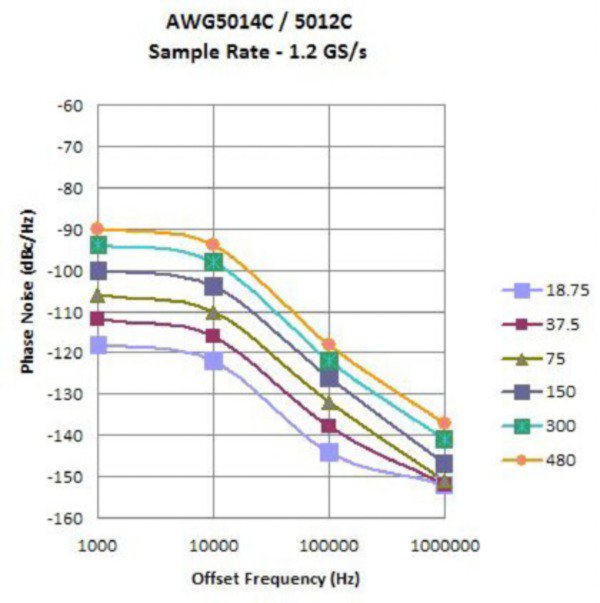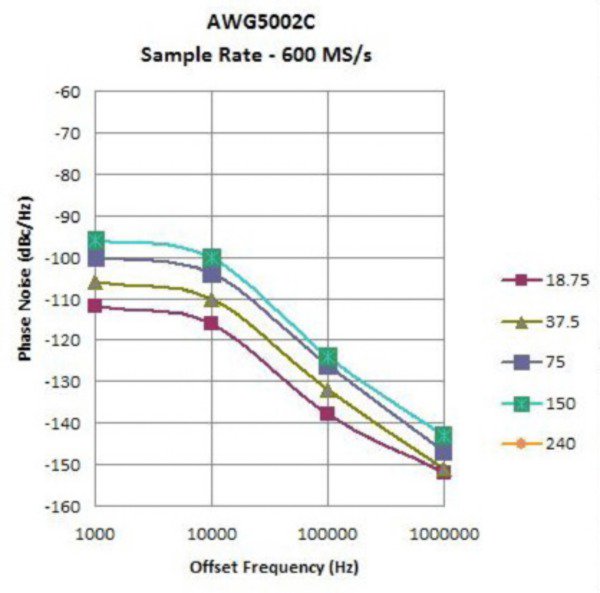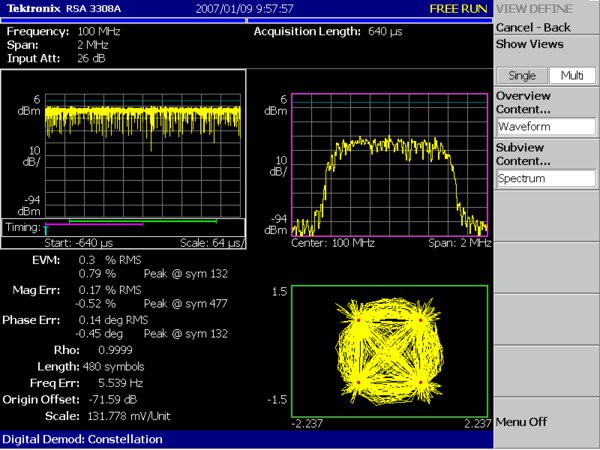
Contact us
Live Chat with Tek representatives. Available 6:00 AM - 4:30 PM
Call us at
Available 6:00 AM – 5:00 PM (PST) Business Days
Download
Download Manuals, Datasheets, Software and more:
Feedback
Arbitrary Waveform Generators
AWG5000 Series Data Sheet
The products on this datasheet are no longer being sold by Tektronix.
View Tektronix Encore for reconditioned test equipment.
Check support and warranty status for these products.
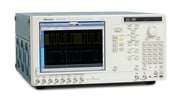
The AWG5000 Series of arbitrary waveform generators offers the industry's best solution to the challenging signal stimulus issues faced by designers who need to verify, characterize, and debug sophisticated electronic designs.
With an excellent dynamic range over all modulation bandwidths, the AWG5000 Series models provide a 14-bit DAC, sample rates up to 1.2 GS/s, 2 to 4 output channels, synchronized 4 to 8 digital marker outputs, and 28 channels of digital data outputs. These instruments easily solve the toughest measurement challenges in wireless communications, defense electronics, digital consumer product design, data conversion equipment, test system synchronization, and semiconductor design and test.
The open windows (Windows 7) based instruments are easy, convenient to use, and connect with peripherals and other third-party software.
Notice to EU customers
This product is not updated to comply with the RoHS 2 Directive 2011/65/EU and will not be shipped to the EU. Customers may be able to purchase products from inventory that were placed on the EU market prior to July 22, 2017 until supplies are depleted. Tektronix is committed to helping you with your solution needs. Please contact your local sales representative for further assistance or to determine if alternative product(s) are available. Tektronix will continue service to the end of worldwide support life.
Key performance specifications
-
480 MHz carrier, high dynamic range RF signals
- High dynamic range IF signals with up to 180 MHz modulation bandwidth
- 180 MHz modulation bandwidth with -58 dBc SFDR
Key features
- Only stand-alone AWG with 4 channels simplifies test setup and reduces uncertainty
- RFXpress software enables quick creation of digitally modulated and radar signals
- Waveform sequencing and sub-sequencing
- Enables creation of infinite waveform loops, jumps, and conditional branches
- Enhance the ability to replicate real-world signal behavior
- Dynamic jump capability
- Enables the creation of complex waveforms that respond to changing external environment
- 2 or 4 differential/single-ended outputs provide testing flexibility
- Up to 8 marker outputs ideal for system synchronization
- 28 digital output channels create highly precise digital signals
- Deep memory enables the creation of long complex waveform sequences
- Playback of signals captured on scopes and real-time spectrum analyzers allows for simulation of real-world environments
- Down to 800 ps resolution edge timing shift control
- 8,000 steps real-time sequencing creates infinite waveform loops, jumps, and conditional branches
- Easy to use and learn, shortens test time
- Convenient bench-top form factor
- Integrated PC supports network integration and provides a built-in DVD, removable hard drive, LAN, and USB ports
Applications
- High-resolution wireless communications and defense electronics
- Education and research
- ADC/DAC testing
- Mixed-signal design and test
- Real-world, ideal, or distorted signal generation – including all the glitches, anomalies, and Impairments
- System synchronization and timing control for large-scale test systems
Industry's best mixed signal stimulus solution for today's complex measurement challenges

EVM/Constellation Measurement
The AWG5000 series delivers the optimal combination of sample rate, vertical resolution, signal fidelity, and waveform memory length, all in an easy-to-use self-contained package.
The capabilities of the series are further enhanced by the addition of key features:
Equation Editor
The Equation Editor is an ASCII text editor that uses text strings to create waveforms by loading, editing, and compiling equation files. The editor provides control and flexibility to create more complex waveforms using customer-defined parameters.
Waveform sequencing and sub-sequencing
Real-time sequencing creates infinite waveform loops, jumps, and conditional branches for longer pattern-length generation suitable for replicating real-world behavior of serial transmitters.
Dynamic Jump
The Dynamic Jump capability enables the creation of complex waveforms by enabling the ability to dynamically jump to any predefined index in a waveform sequence. Users can define up to 16 distinct jump indexes that respond to changing external environments.
LXI Class C
Using the LXI Web Interface, you can connect to the AWG5000 Series through a standard web browser by simply entering the AWG's IP address in the address bar of the browser. The web interface enables viewing of instrument status and configuration, as well as status and modification of network settings. All web interaction conforms to the LXI Class C specification.
Wireless I/Q wideband and IF signal generation
The AWG5000 Series provides good SFDR over modulation bandwidths up to 180 MHz, meeting the demands of IQ and IF signal generation.
The RFXpress (RFX100) software package utilizes the raw AWG performance to simplify the creation of RF signals. Supporting a wide range of modulation schemes, the software is flexible enough to create either generic or propriety signals for digital communication systems. Power ramping, frequency hopping, and impairments can easily be added to generate the desired signal.
Radar signal creation
Radar Signal Creation is a software module for RFXpress that gives you the ultimate flexibility in creating pulsed radar waveforms. It gives you the ability to build your own radar pulse suite starting from pulse-to-pulse trains to pulse groups. It supports a variety of modulation schemes including LFM, Barker and Polyphase Codes, User-defined Codes, Step FM, Nonlinear FM, User-defined FM, and Custom modulation. It also has the ability to generate pulse trains with staggered PRI to resolve range and doppler ambiguity, frequency hopping for Electronic Counter-Counter Measures (ECCM), and pulse-to-pulse amplitude variation to simulate Swerling target models including antenna scan patterns, clutter, and multipath effects. RFXpress is a powerful easy-to-use software package to synthesize IQ and IF signals for arbitrary waveform generators. It runs as an integral part of the AWG5000 Series or from an external PC.
Environment signal generation
Radar signals must coexist with other commercial standard signals sharing the same spectrum, yet are still expected to perform with no performance degradation. This isn't unreasonable given its mission-critical operations. To meet this expectation, a radar designer has to thoroughly test all the corner cases at the design/debug stage. The AWG5000 and RFXpress Environment plug-in offers extreme flexibility to define and create these worst-case scenarios.
You can specify up to 25 signals to define your environment, including WiMAX, WiFi, GSM, GSM-EDGE, EGPRS 2A, EGPRS2B, CDMA, W-CDMA, DVB-T, Noise, and CW Radar. This plug-in also allows you to seamlessly import signals from other RFXpress plug-ins (including Radar, Generic Signal, etc.), as well as from Matlab®and from Tektronix spectrum analyzers and oscilloscopes, into your environment. You can also configure PHY parameters of your standard-specific signals. You can define the carrier frequency, power, start time, and duration for all the signals in your environment, so you have full control over the way these signals interact/interfere with each other.
Mixed-signal generation
The AWG5012 and AWG5002 models have optional 28 digital output channels with high-resolution edge placement, making them a great solution for digital signal generation applications, such as digital design and validation, system synchronization, and ADC/DAC testing.
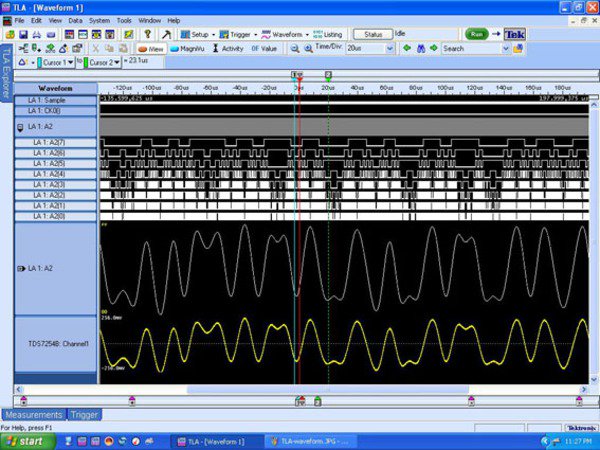
Mixed-signal test by TDS/TLA iView.
Specifications
All specifications are guaranteed unless noted otherwise. All specifications apply to all models unless noted otherwise.
Model overview
| AWG5014C | AWG5012C | AWG5002C | ||
|---|---|---|---|---|
| Digital to analog converter | ||||
| Sample rate | 10 MS/s to 1.2 GS/s | 10 MS/s to 600 MS/s | ||
| Resolution | 14 bit | |||
| Sin (x)/x roll-off | ||||
| Sin (x)/x (-1 dB) | 300 MHz | 150 MHz | ||
| Sin (x)/x (-3 dB) | 520 MHz | 260 MHz | ||
Frequency domain characteristics
- Effective frequency output
- Fmaximum (specified) is determined as "sample rate / oversampling rate" or "SR/2.5"
- Fmaximum
-
AWG5014C, AWG5012C AWG5002C 480 MHz 240 MHz - Fmaximum (typical)
-
AWG5014C, AWG5012C AWG5002C 540 MHz 275 MHz
- Effective frequency switching time, standard
- Minimum frequency switching time from selected frequencies F1 to F2 is determined as "1/Fmaximum".
- Ts
-
AWG5014C, AWG5012C AWG5002C 2.1 ns 4.2 ns - Ts (typical)
-
AWG5014C, AWG5012C AWG5002C 1.8 ns 3.7 ns
- Modulation bandwidth
- Modulation bandwidth is a combination of sin(x)/x and rise time bandwidths, defined as the lower of the sin(x)/x bandwidth or the calculated percentage of rise time bandwidth (as shown).
- -1 dB BW = 0.932 × (-1 dB TrBW), typical
-
AWG5014C, AWG5012C WG5002C Normal: Up to 130 MHz
Direct: Up to 180 MHzNormal: Up to 100 MHz
Direct: Up to 130 MHz - -3 dB BW = 0.913 × (-3 dB TrBW), typical
-
AWG5014C, AWG5012C WG5002C Normal: Up to 230 MHz
Direct: Up to 300 MHzNormal: Up to 180 MHz
Direct: Up to 230 MHz
- Output amplitude
- Amplitude levels are measured as single-ended outputs. Amplitude level will be 3 dBm higher when using differential (both) outputs.
- Range (typical)
-
Normal: -30 dBm to 17 dBm
Direct: -30 dBm to 0 dBm
- Resolution (typical)
- 0.01 dB
- Accuracy (typical)
- At 0 dBm level, with no offset, ±0.3 dB
- Output flatness, typical
- Mathematically corrected for characteristic Sin (x)/x roll-off, uncorrected by external calibration methods.
±1.0 dB, from 10 MHz to 480 MHz
- Digital data out (option 3)
-
- Number of outputs
- 14-bit output on Ch1 and Ch2 (28 total)
- Output connector
- SMB (rear panel), single ended
- Output impedance
- 50 Ω
- Digital data out levels (into 50 Ω)
-
- Window
- -1.0 V to 2.7 V
- Amplitude
- 0.1 Vp-p to 3.7 Vp-p
- Resolution
- 10 mV
- Accuracy
- ±(10% of setting + 120 mV)
- Current (max)
- ±54 mA per channel
- Rise/fall time (20% to 80%)
- 300 ps (1.0 Vp-p, Hi: 1.0 V, Lo: 0 V)
- Delay from marker
- -41 ns to -82 ns
- Skew between outputs
- <400 ps
Time domain characteristics
- Data rate
- Bit rate is determined as "sample rate / 4 points per cycle", allowing full impairment generation
- Bit rate (typical)
-
AWG5014C, AWG5012C AWG5002C 300 Mb/s 150 Mb/s
- Rise/fall time
- Rise/fall time measured at 10% to 90% levels
- Tr/Tf
-
Normal: 1.4 ns
Direct: 0.95 ns
- Rise time bandwidth
- Rise-time bandwidth converted from rise-time (0.34/Tr, assumed Gaussian transition) characteristics through analog output circuitry and cabling.
- Tr bandwidth (-1 dB) (typical)
-
Normal: 140 MHz
Direct: 210 MHz
- Tr bandwidth (-3 dB) (typical)
-
Normal: 250 MHz
Direct: 370 MHz
- Low-pass filter
- Normal: Bessel type, 50 and 100 MHz
- Output amplitude
-
Amplitude levels are measured between differential outputs (+) and (-). For single-ended output (+) the amplitude level will be one-half the levels below.
- Range
-
Normal: 40 mVp-pto 9.0 Vp-p
Direct: 40 mVp-pto 1.2 Vp-p
- Resolution
- 1.0 mV
- Accuracy
- At 0.5 V, with no offset, ±(2% of amplitude + 2 mV)
- Offset
-
- Range
- Normal: ±2.25 V
- Resolution
- 1.0 mV
- Accuracy
- At minimum amplitude, ±(2.0% of offset +15 mV)
Output distortion characteristics
- Spurious Free Dynamic Range (SFDR), direct, typical
- SFDR is determined as a function of the directly generated carrier frequency. Harmonics not included
- DC to 10 MHz carrier
-
AWG5014C, AWG5012C Clock: 1.2 GS/s, 14-bit operation
Frequency: 10 MHz to 480 MHz
Level: 4 dBm (1 Vp-p)
Offset: None
AWG5002C Clock: 0.6 GS/s, 14-bit operation
Frequency: 10 MHz to 240 MHz
Level: 4 dBm (1 Vp-p)
Offset: None
-70 dBc -74 dBc - 10 to 20 MHz carrier
-
-70 dBc -70 dBc - 20 to 40 MHz carrier
-
-62 dBc -62 dBc - 40 to 80 MHz carrier
-
-62 dBc -57 dBc - 80 to 150 MHz carrier
-
-58 dBc -54 dBc - 150 to 300 MHz carrier
-
-58 dBc -54 dBc - 300 to 480 MHz carrier
-
-56 dBc
- Spurious Free Dynamic Range (SFDR), direct, typical
- When viewed as a modulation bandwidth and used with external frequency up-conversion, the specifications will hold and be independent of carrier frequency with proper conversion circuitry design. Harmonics not included
- DC to 10 MHz carrier
-
AWG5014C, AWG5012C Clock: 1.2 GS/s, 14-bit operation
Modulation Bandwidth: Up to 180 MHz
Level: 4 dBm (1 Vp-p)
Offset: None
AWG5002C Clock: 0.6 GS/s, 14-bit operation
Modulation Bandwidth: Up to 130 MHz
Level: 4 dBm (1 Vp-p)
Offset: None
-70 dBc -74 dBc - DC to 20 MHz carrier
-
-70 dBc -70 dBc - DC to 40 MHz carrier
-
-62 dBc -62 dBc - DC to 80 MHz carrier
-
-62 dBc -57 dBc - DC to 150 MHz carrier
-
-58 dBc -54 dBc - DC to 180 MHz carrier
-
-58 dBc
- Harmonic distortion
-
- Harmonics
-
AWG5014C, AWG5012C Clock: 1.2 GS/s, 14-bit operation
32-point waveform
37.5 MHz output
Normal: 10 dBm (2.0 Vp-p)
Direct: 0 dBm (0.6 Vp-p)
Offset: None
AWG5002C Clock: 0.6 GS/s, 14-bit operation
32-point waveform
18.7 MHz output
Normal: 10 dBm (2.0 Vp-p)
Direct: 0 dBm (0.6 Vp-p)
Offset: None
Normal: <40 dBc
Direct: <49 dBcNormal: <46 dBc
Direct: <55 dBc
- Non-harmonic distortion
-
- Spurious
-
AWG5014C, AWG5012C Clock: 1.2 GS/s, 14-bit operation
Frequency: 10 MHz to 480 MHz
Level: 4 dBm (1 Vp-p)
Offset: None
AWG5002C Clock: 0.6 GS/s, 14-bit operation
Frequency: 10 MHz to 240 MHz
Level: 4 dBm (1 Vp-p)
Offset: None
< -60 dBc
- Phase noise distortion
-
AWG5014C, AWG5012C AWG5002C Clock: 1.2 GS/s, 14-bit operation
32-point waveform
37.5 MHz output
Amplitude: 10 dBm (2 Vp-p) at 0 offset, < -85 dBc/Hz at 10 kHz offsetClock: 0.6 GS/s, 14-bit operation
32-point waveform
18.7 MHz output
Amplitude: 10 dBm (2 Vp-p) at 0 offset, < -85 dBc/Hz at 10 kHz offset
AWG5014C/AWG5012C phase noise (typical)
AWG5002C phase noise (typical)
- Jitter
-
- Random jitter (typical)
-
1010 clock pattern, RMS value
Normal: 5.0 ps - Total jitter (typical)
- 215 - 1 data pattern (at 10-12 BER), peak-peak value
Normal: 150 ps at 0.5 Gb/s
Hardware characteristics
- Number of outputs
-
AWG5014C, AWG5012C: 4 channels
AWG5002C 2 channels
- Output connector
- Differential, BNC (front panel)
- Output impedance
- 50 Ω
- Waveform length
-
Standard - to 16M points
Extended memory - to 32M points
- Number of waveforms
- 1 to 16,200
- Sequence length/counter
-
1 to 8,000 steps
1 to 65,536 count
- Run modes
-
- Continuous
- Waveform is iteratively output. If a sequence is defined, the sequence order and repeat functions are applied.
- Triggered
- Waveform is output only once when an internal, external, programmatic (GPIB, LAN), or manual trigger is received.
- Gated
- Waveform begins output when gate is "True" and resets when gate is "False".
- Sequence
- Waveform is output as defined by the sequence selected.
- Jump
- Synchronous and asynchronous.
- Sampling clock
-
- Resolution
- 8 digits
- Accuracy
-
Within ±(1 ppm + Aging)
Aging: Within ±1 ppm per year
- Internal trigger generator
-
- Range
- 1.0 µs to 10.0 s
- Resolution
- 3 digits, 0.1 µs minimum
- Output skew control
-
- Range
- -5 ns to 5 ns
- Resolution
- 5 ps
Software characteristics
- Operating system / peripherals / IO
-
Windows 7
4 GB memory CD/DVD drive (front panel)
300 GB Solid State Drive (std) / 1 TB Mechanical Hard Disk Drive (opt) (rear-panel removable, optional front mount kit)
USB compact keyboard and mouse
USB 2.0 compliant ports (6 total - 2 front, 4 rear)
PS/2 mouse and keyboard connections (rear panel)
RJ-45 Ethernet connector (rear panel) supports 10/100/1000BASE-T
eSATA (rear panel)
DVI/I Video (rear panel)
- Display characteristics
- LED backlit monitor with touch screen, 10.4 in. (264 mm) 1024 × 768 (V) XGA
- Waveform file import capability
-
Import waveform format by series:
*.AWG file created by Tektronix AWG5000 or AWG7000 Series
*.PAT, *.SEQ, *.WFM, and *.EQU file formats created by Tektronix arbitrary waveform generators such as the AWG400/500/600/700 Series
*.TIQ and *.IQT files created by Tektronix real-time spectrum analyzers
*.TFW file created by Tektronix AFG3000 Series arbitrary/function generators
*.DTG file created by Tektronix DTG5000 Series data timing generators
*.WFM or *.ISF file created by Tektronix TDS/DPO Series oscilloscopes text file (*.TXT)
- Waveform file export capability
-
Export waveform format by series:
Tektronix AWG400/500/600/700 (*.wfm or *.pat) and text format
- Software driver for third-party applications
- IVI-COM driver, MATLAB library
- Instrument control / data transfer
-
- GPIB
- Remote control and data transfer (conforms to IEEE-Std 488.1, compatible with IEEE-Std 488.2 and SCPI-1999.0)
- Ethernet
- Remote control and data transfer (conforms to IEEE-Std 802.3)
- TekLink
- Remote control and data transfer (proprietary bus for Tektronix product high-speed interconnection and communication)
- LAN eXtensions for Instrumentation (LXI)
- Class LXI Class C, version 1.3
Auxiliary output characteristics
- Markers
-
- Number
- AWG5014C: Total of 8 (2 per channel)
AWG5012C, AWG5002C: Total of 4 (2 per channel)
- Style
- Single-ended
- Connector
- BNC (front panel)
- Impedance
- 50 Ω
- Level (into 50 Ω)
-
Amplitude levels are measured between differential outputs (+) to (-). Single-ended output amplitude level will be one-half the voltage levels below.
Window -2.0 V to 5.4 V Amplitude 0.2 Vp-p to 7.4 Vp-p Resolution 10 mV Accuracy ±(10% of setting + 120 mV) Rise/fall time (20% - 80%) 300 ps (1.0 Vp-p, Hi: 1.0 V, Lo: 0.0 V) - Timing skew
-
Range 0 to 1000 ps Resolution 50 ps - Delay control
-
Range 0 to 300 ps Resolution 1 ps Accuracy ±(5% of setting + 50 ps) - Jitter
-
Random RMS (typical) 5 ps Total p - p (typical) 80 ps (215 - 1 PN pattern at 10-12 BER)
- 10 MHz reference out
-
- Amplitude
- 1.2 Vp-p into 50 Ω, maximum 2.5 V open
- Connector
- BNC (rear panel)
- Impedance
- 50 Ω, AC coupled
- Clock output (VCO)
-
- Range
- 600 MHz, 1.2 GHz
- Amplitude
- 0.4 Vp-p into 50 Ω to ground
- Connector
- BNC (rear panel)
- Impedance
- 50 Ω, AC coupled
- DC outputs
-
- Number
- 4, independently controlled
- Range
- -3.0 V to 5.0 V
- Resolution
- 10 mV
- Accuracy
- ±(3% of setting + 120 mV)
- Connector
- 2×4 pin header (front panel)
- Current (max)
- ±100 mA
Auxiliary input characteristics
- Trigger / gate in
-
- Polarity
- Pos or neg
- Range
-
50 Ω: ±5 V
1 kΩ: ±10 V
- Jitter (typical)
- 2.0 ns to 4.5 ns
- Connector
- BNC (front panel)
- Impedance
- 50 Ω, 1 kΩ
- Threshold
- Level: -5.0 V to 5.0 V
Resolution: 0.1 V
- Trigger to output uncertainty
- Asynchronous (typical):
Between internal/external clock and trigger timing: 2.0 ns to 4.5 ns
- Trigger mode
-
Minimum pulse width 20 ns Trigger hold-off 160 × sampling period - 200 ns Delay to output 48 × sampling period + 500 ns - Gated mode
-
Minimum pulse width 1024 × sampling period + 10 ns Delay to output 240 × sampling period + 500 ns
- Event in
-
- Polarity
- Pos or neg
- Range
-
50 Ω: ±5 V
1 kΩ: ±10 V
- Connector
- BNC (front panel)
- Impedance
- 50 Ω, 1 kΩ
- Threshold
- Level: -5.0 V to 5.0 V
Resolution: 0.1 V
- Sequence mode
-
Minimum pulse width 20 ns Event hold-off 200 × sampling period + 500 ns Delay to output 260 × sampling period + 300 ns (Jump timing: asynchronous jump)
- External clock in
-
- Input voltage range
- 0.2 Vp-p to 0.8 Vp-p, -10 dBm to 2 dBm
- Frequency range
- 600 MHz to 1.2 GHz (acceptable frequency drift of ±5%)
- Clock divider
- 1/1, 1/2, 1/4...1/256
- Connector
- BNC (rear panel)
- Impedance
- 50 Ω, AC coupled
- Fixed reference clock in
-
- Input voltage range
- 0.2 Vp-p to 3.0 Vp-p, -10 dBm to 14 dBm
- Frequency range
- 10 MHz, 20 MHz, 100 MHz (within ±0.1%)
- Connector
- BNC (rear panel)
- Impedance
- 50 Ω, AC coupled
- Phase lock in
-
- Input voltage range
- 0.2 Vp-p to 3.0 Vp-p, -10 dBm to 14 dBm
- Frequency range
- 5 MHz to 600 MHz (acceptable frequency drift is ±0.1%)
- Multiplier rate
- 1 to 240
- Connector
- BNC (rear panel)
- Impedance
- 50 Ω, AC coupled
- Add in
-
- Input voltage range
- ±1.0 V
- DC gain
- 1
- Bandwidth
- DC to 100 MHz (-3 dB)
- Connector
- BNC (rear panel)
- Impedance
- 50 Ω, AC coupled
Physical characteristics
- Dimensions
-
- Height
-
mm inches 245 9.6 - Width
-
mm inches 465 18.0 - Depth
-
mm inches 500 19.7
- Weight
-
- Net (instrument)
-
kg lb. 19.5 43 - Net (with packaging)
-
kg lb. 28.5 62.7
- Mechanical cooling
- Clearance
- Top/bottom
-
cm inches 2 0.8 - Side
-
cm inches 15 6 - Rear
-
cm inches 7.5 3
- Power supply
-
- Rating
- 100 to 240 V AC, 47 to 63 Hz
- Consumption
- 450 Watts
EMC environment and safety
- Temperature
-
- Operational
- 10 to 40 °C
- Non-operational
- 20 to 60 °C
- Humidity
-
- Operational
- 5% to 80% relative humidity (% RH) at up to 30 °C, 5% to 45% relative humidity above 30 °C up to 50 °C
- Non-operational
- 5% to 90% relative humidity (% RH) at up to 30 °C, 5% to 45% relative humidity above 30 °C up to 50 °C
- Altitude
-
- Operational
- Up to 10,000 ft. (3,048 m)
- Non-operational
- Up to 40,000 ft. (12,192 m)
- Vibration
-
- Sine
-
Operational 0.33 mm p-p (0.013 in p-p) constant displacement, 5 to 55 Hz Non-operational NA - Random
-
Operational 0.27 g RMS, 5 to 500 Hz, 10 minutes per axis Non-operational 2.28 g RMS, 5 to 500 Hz, 10 minutes per axis
- Mechanical
-
- Operational
- Half-sine mechanical shocks, 30 g peak, 11 ms duration, 3 drops in each direction of each axis
- Non-operational
- Half-sine mechanical shocks, 10 g peak, 11 ms duration, 3 drops in each direction of each axis
- Regulatory
-
- Safety
- UL61010-1, CAN/CSA-22.2, No.61010-1-04, EN61010-1, IEC61010-1
- Emissions
- EN55011 (Class A), IEC61000-3-2, IEC61000-3-3
- Immunity
- IEC61326, IEC61000-4-2/3/4/5/6/8/11
- Regional certifications
-
Europe EN61326 Australia/New Zealand AS/NZS 2064
Ordering information
Arbitrary waveform generator mainframe
- AWG5014C
- 1.2 GS/s, 14-bit resolution, 16M point per channel, 4-channel arbitrary waveform generator
- AWG5012C
- 1.2 GS/s, 14-bit resolution, 16M point per channel, 2-channel arbitrary waveform generator
- AWG5002C
- 600 MS/s, 14-bit resolution, 16M point per channel, 2-channel arbitrary waveform generator
Instrument options
Product options
AWG5014C, AWG5012C, AWG5002C
- Opt. 01
-
Waveform record length expansion (from 16M point to 32M point)
- Opt. 05
-
Removable mechanical HDD (1 TB)
- Opt. 09
-
Sub-sequencing and Dynamic Jump option (sub-sequencing files created for legacy AWG400, AWG500, AWG600, and AWG700 instrument are compatible with this option)
- Opt. RFX
- Adds RFXpress (RFX100) software to the AWG
- Opt. RDR
-
Adds radar signal generation to RFXpress1
- Opt. SPARA
-
Adds S-parameter emulation to RFXpress1
- Opt. OFDM
-
Adds OFDM signal generation to RFXpress1
- Opt. ENV
-
Adds environment signal generation to RFXpress1
- Opt. ENV01
- Bundling option - Opt. ENV + Opt. RDR1
- Opt. ENV02
- Bundling option - Opt. ENV + Opt. RDR + Opt. OFDM1
- Opt. ENV03
- Bundling option - Opt. ENV + Opt. RDR + Opt. OFDM + Opt. SPARA1
- Opt. ENV04
- Bundling option - Opt. ENV + Opt. RDR + Opt. OFDM + Opt. SPARA + Opt. UWBCT1
- Opt. UWBCF
- Adds UWB-WiMedia conformance signal generation to RFXpress1
- Opt. UWBCT
- Adds UWB-WiMedia custom and conformance signal generation to RFXpress1
AWG5012C, AWG5002C
- Opt. 03
-
28-bit digital data outputs (digital data of CH1 and CH2)
Note: Must be ordered at time of purchase
- Opt. 0309
- Combination of Opt. 03 and Opt. 09
Note : Must be ordered at time of purchase
1Requires Opt. RFX
Power plug options
- Opt. A0
- North America power plug (115 V, 60 Hz)
- Opt. A1
- Universal Euro power plug (220 V, 50 Hz)
- Opt. A2
- United Kingdom power plug (240 V, 50 Hz)
- Opt. A3
- Australia power plug (240 V, 50 Hz)
- Opt. A4
- North America power plug (240 V, 50 Hz)
- Opt. A5
- Switzerland power plug (220 V, 50 Hz)
- Opt. A6
- Japan power plug (100 V, 50/60 Hz)
- Opt. A10
- China power plug (50 Hz)
- Opt. A11
- India power plug (50 Hz)
- Opt. A99
- No power cord
Language options
- Opt. L0
- English manual
- Opt. L5
- Japanese manual
- Opt. L7
- Simplified Chinese manual
- Opt. L8
- Traditional Chinese manual
- Opt. L10
- Russian manual
Language options include translated front-panel overlay for the selected language(s).
Application software
- SDX100
-
Jitter-generation software package (includes USB dongle)
- Opt. ISI
-
S-parameter and ISI creation (requires SDX100 as prerequisite)
- Opt. SSC
- Spread Spectrum Clock addition option (requires SDX100 as prerequisite)
Service options
- Opt. CA1
- Single calibration or functional verification
- Opt. C3
- Calibration Service 3 Years
- Opt. C5
- Calibration Service 5 Years
- Opt. D1
- Calibration Data Report
- Opt. D3
- Calibration Data Report 3 Years (with Opt. C3)
- Opt. D5
- Calibration Data Report 5 Years (with Opt. C5)
- Opt. R3
- Repair Service 3 Years (including warranty)
- Opt. R5
- Repair Service 5 Years (including warranty)
Post sales service options (e.g. AWG5014C-CA1)
- CA1
- Single calibration or functional verification
- R3DW
- Repair service coverage 3 years
- R5DW
- Repair service coverage 5 years
- R2PW
- Repair service coverage 2 years post warranty
- R1PW
- Repair service coverage 1 year post warranty
Product upgrade options
| Option | Product | Description |
|---|---|---|
| M01 | AWG5002C models | Waveform record length expansion from 16M point to 32M point |
| M02 | AWG5012C models | Waveform record length expansion from 16M point to 32M point |
| M03 | AWG5014C models | Waveform record length expansion from 16M point to 32M point |
| D01 | All AWG5000C models | Additional removable disk - solid state |
| D02 | All AWG5000C models | Additional removable disk - mechanical |
Note: To add any RFXpress software as an upgrade, please refer to the RFX100 data sheet.
Standard accessories
Accessories
- 200-4963-xx
- Front cover
- 119-7054-xx
- USB mouse
- 119-7083-xx
- Compact USB keyboard
- 012-1697-xx
- Lead set for DC output
- 020-3099-xx
- AWG5000C Series product software CD and instructions
- 063-4134-xx
- Documentation CD with browser
- 071-3174-xx
- Installation and safety manual
- —
- Certificate of calibration
- As ordered
- Power cord


